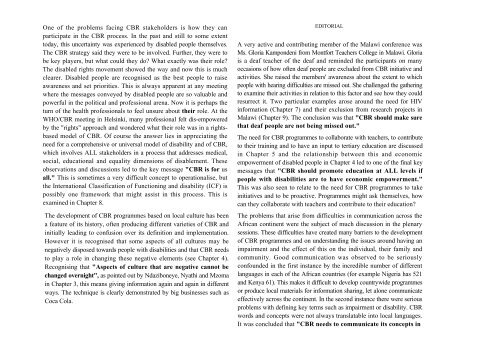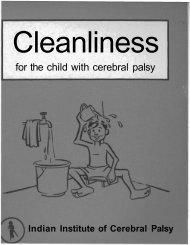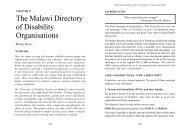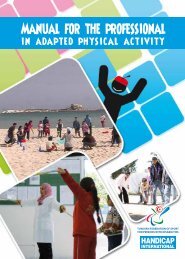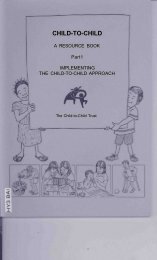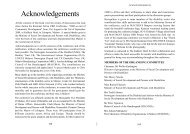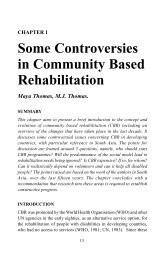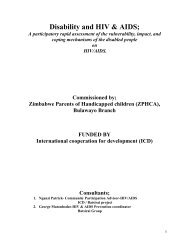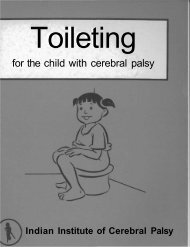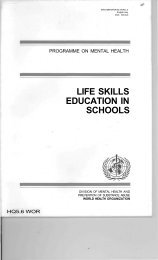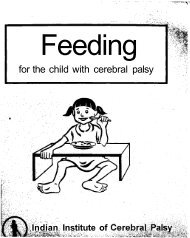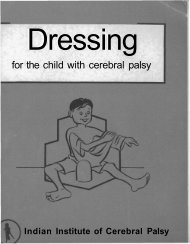CBR AS PART OF COMMUNITY DEVELOPMENT - Source
CBR AS PART OF COMMUNITY DEVELOPMENT - Source
CBR AS PART OF COMMUNITY DEVELOPMENT - Source
Create successful ePaper yourself
Turn your PDF publications into a flip-book with our unique Google optimized e-Paper software.
One of the problems facing <strong>CBR</strong> stakeholders is how they can<br />
participate in the <strong>CBR</strong> process. In the past and still to some extent<br />
today, this uncertainty was experienced by disabled people themselves.<br />
The <strong>CBR</strong> strategy said they were to be involved. Further, they were to<br />
be key players, but what could they do? What exactly was their role?<br />
The disabled rights movement showed the way and now this is much<br />
clearer. Disabled people are recognised as the best people to raise<br />
awareness and set priorities. This is always apparent at any meeting<br />
where the messages conveyed by disabled people are so valuable and<br />
powerful in the political and professional arena. Now it is perhaps the<br />
turn of the health professionals to feel unsure about their role. At the<br />
WHO/<strong>CBR</strong> meeting in Helsinki, many professional felt dis-empowered<br />
by the "rights" approach and wondered what their role was in a rightsbased<br />
model of <strong>CBR</strong>. Of course the answer lies in appreciating the<br />
need for a comprehensive or universal model of disability and of <strong>CBR</strong>,<br />
which involves ALL stakeholders in a process that addresses medical,<br />
social, educational and equality dimensions of disablement. These<br />
observations and discussions led to the key message "<strong>CBR</strong> is for us<br />
all." This is sometimes a very difficult concept to operationalise, but<br />
the International Classification of Functioning and disability (ICF) is<br />
possibly one framework that might assist in this process. This is<br />
examined in Chapter 8.<br />
The development of <strong>CBR</strong> programmes based on local culture has been<br />
a feature of its history, often producing different varieties of <strong>CBR</strong> and<br />
initially leading to confusion over its definition and implementation.<br />
However it is recognised that some aspects of all cultures may be<br />
negatively disposed towards people with disabilities and that <strong>CBR</strong> needs<br />
to play a role in changing these negative elements (see Chapter 4).<br />
Recognising that "Aspects of culture that are negative cannot be<br />
changed overnight", as pointed out by Ndaziboneye, Nyathi and Mzoma<br />
in Chapter 3, this means giving information again and again in different<br />
ways. The technique is clearly demonstrated by big businesses such as<br />
Coca Cola.<br />
EDITORIAL<br />
A very active and contributing member of the Malawi conference was<br />
Ms. Gloria Kampondeni from Montfort Teachers College in Malawi. Gloria<br />
is a deaf teacher of the deaf and reminded the participants on many<br />
occasions of how often deaf people are excluded from <strong>CBR</strong> initiative and<br />
activities. She raised the members' awareness about the extent to which<br />
people with hearing difficulties are missed out. She challenged the gathering<br />
to examine their activities in relation to this factor and see how they could<br />
resurrect it. Two particular examples arose around the need for HIV<br />
information (Chapter 7) and their exclusion from research projects in<br />
Malawi (Chapter 9). The conclusion was that "<strong>CBR</strong> should make sure<br />
that deaf people are not being missed out."<br />
The need for <strong>CBR</strong> programmes to collaborate with teachers, to contribute<br />
to their training and to have an input to tertiary education are discussed<br />
in Chapter 5 and the relationship between this and economic<br />
empowerment of disabled people in Chapter 4 led to one of the final key<br />
messages that "<strong>CBR</strong> should promote education at ALL levels if<br />
people with disabilities are to have economic empowerment."<br />
This was also seen to relate to the need for <strong>CBR</strong> programmes to take<br />
initiatives and to be proactive. Programmes might ask themselves, how<br />
can they collaborate with teachers and contribute to their education?<br />
The problems that arise from difficulties in communication across the<br />
African continent were the subject of much discussion in the plenary<br />
sessions. These difficulties have created many barriers to the development<br />
of <strong>CBR</strong> programmes and on understanding the issues around having an<br />
impairment and the effect of this on the individual, their family and<br />
community. Good communication was observed to be seriously<br />
confounded in the first instance by the incredible number of different<br />
languages in each of the African countries (for example Nigeria has 521<br />
and Kenya 61). This makes it difficult to develop countrywide programmes<br />
or produce local materials for information sharing, let alone communicate<br />
effectively across the continent. In the second instance there were serious<br />
problems with defining key terms such as impairment or disability. <strong>CBR</strong><br />
words and concepts were not always translatable into local languages.<br />
It was concluded that "<strong>CBR</strong> needs to communicate its concepts in


